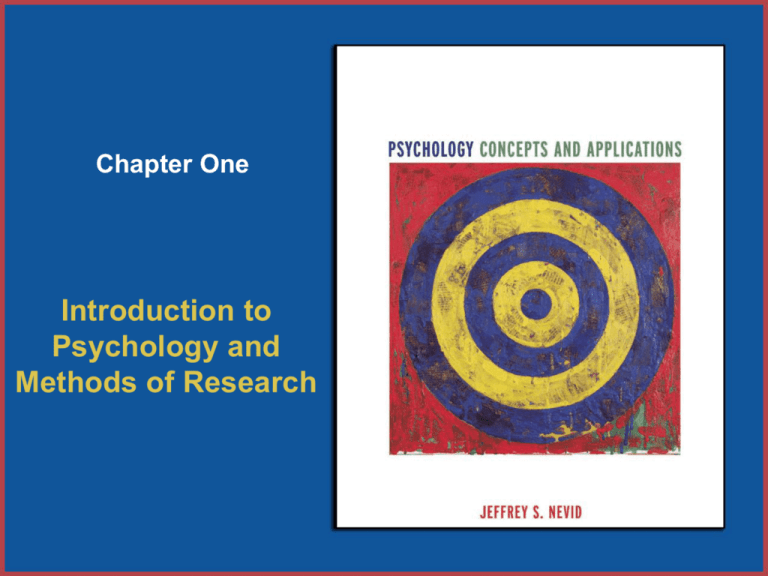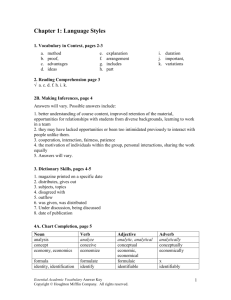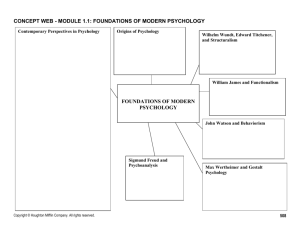
Chapter One
Introduction to
Psychology and
Methods of Research
Copyright © Houghton Mifflin Company. All rights reserved.
1–1
What Is Psychology?
• The science of behavior and mental
processes
Copyright © Houghton Mifflin Company. All rights reserved.
1–2
Module 1.1
Foundations of Modern Psychology
Origins of Psychology
• Greek roots
– Psyche “mind”
– Logos “study” or “knowledge”
• Ancient Greek philosophers
– Socrates (ca. 469-399 B.C.)
– Plato (ca. 428-348 B.C.)
– Aristotle (ca. 384-332 B.C.)
• Confucius (ca. 551-479 B.C.)
Copyright © Houghton Mifflin Company. All rights reserved.
1–4
Origins of Psychology (cont’d)
• Late 19th century
– Emergence of psychology as a scientific discipline
• Gustav Theodor Fechner
– Study of psychophysics
• Hermann von Helmholtz
– Study of sensation and perception
• Wilhelm Wundt
– Founder of psychology as independent
science
Copyright © Houghton Mifflin Company. All rights reserved.
1–5
Early Psychology: Structuralism
• Defining the structure of the mind
• Breaking down mental experience into parts
• Wilhelm Wundt (1832-1920)
– Method of introspection
• Edward Titchener (1867-1927)
• G. Stanley Hall (1844-1924)
Copyright © Houghton Mifflin Company. All rights reserved.
1–6
Early Psychology: Functionalism
• William James (1842-1910)
• Focus on functions of behavior
– Why we do what we do
– Influence of Darwin’s theory of evolution
• Adaptive behaviors more likely to survive
• Focus on stream of consciousness
Copyright © Houghton Mifflin Company. All rights reserved.
1–7
Early Psychology: Behaviorism
• John Watson (1878-1958)
• Study of behavior: overt and observable
• Rejection of introspection
Copyright © Houghton Mifflin Company. All rights reserved.
1–8
Early Psychology: Gestalt
• Max Wertheimer (1880-1943)
• Gestalt: “unitary form” or “pattern”
• Focus on how the brain organizes information
– Unified or organized wholes
– “Whole is greater than the sum of the parts”
Copyright © Houghton Mifflin Company. All rights reserved.
1–9
Early Psychology: Psychoanalysis
• Sigmund Freud (1856-1939)
• Focus on unconscious mind
– Primitive drives, wishes, impulses
• Key role of childhood experiences
Copyright © Houghton Mifflin Company. All rights reserved.
1–10
Contemporary Psychology
• Behavioral
• Psychodynamic
• Humanistic
• Physiological
• Cognitive
• Sociocultural
Copyright © Houghton Mifflin Company. All rights reserved.
1–11
Behavioral Perspective
• Traditional behavioral perspective
– Focus on observable behavior
– Impact of learning on behavior
• Environmental factors
• Rewards, punishments
• Social-cognitive theory
• Behavior therapy
• Cognitive-behavioral therapy
Copyright © Houghton Mifflin Company. All rights reserved.
1–12
Psychodynamic Perspective
• Early founder: Sigmund Freud
• Today’s “neo-Freudians”
• Focus on
– Unconscious life of the mind
• Fantasies
• Wishes
• Dreams
• Hidden motives…
Copyright © Houghton Mifflin Company. All rights reserved.
1–13
Humanistic Perspective
• Abraham Maslow (1908-1970)
• Carl Rogers (1902-1987)
• Emphasis on
– Free will
– Conscious choice and experiences
– Unique characteristics
– Self-awareness
Copyright © Houghton Mifflin Company. All rights reserved.
1–14
Physiological Perspective
• Relationships between biological processes
and behavior
• Study of
– Brain, nervous system
– Hormones
– Heredity
• Evolutionary psychology
Copyright © Houghton Mifflin Company. All rights reserved.
1–15
Cognitive Perspective
• Study mental processes, acquisition of
knowledge, information
– Thinking
– Language
– Memory
– Decision making
– Problem solving
Copyright © Houghton Mifflin Company. All rights reserved.
1–16
Sociocultural Psychology
• Social and cultural influences on behavior
– Ethnicity
– Gender
– Lifestyle
– Income level
– Culture
Copyright © Houghton Mifflin Company. All rights reserved.
1–17
Module 1.2
Psychologists: Who They Are and
What They Do
Copyright © Houghton Mifflin Company. All rights reserved.
1–18
Images of “A Psychologist”
• Typical: Clinical Psychologist
• Many other types and activities
– Teaching
– Research
– Schools
– Businesses
Copyright © Houghton Mifflin Company. All rights reserved.
1–19
Psychological Research
• Basic research
– Focuses on acquiring knowledge, even if no
practical application
• Applied research
– Focuses on finding solutions to specific problems
Copyright © Houghton Mifflin Company. All rights reserved.
1–20
Specialty Areas
• Experimental psychology
• Environmental psychology
• Clinical psychology
• Counseling psychology
• Industrial/Organizational
psychology
• School psychology
• Health psychology
• Educational psychology
• Consumer psychology
• Developmental psychology
• Neuropsychology
• Personality psychology
• Geropsychology
• Social psychology
• Forensic psychology
• Environmental psychology
• Sports psychology
Copyright © Houghton Mifflin Company. All rights reserved.
1–21
Psychology and Diversity
• Women in early psychology
– Christine Ladd-Franklin (1847-1930)
– Mary Whiton Calkins (1863-1930)
– Margaret Floy Washburn (1871-1939)
• African Americans in early psychology
– Gilbert Haven Jones (1883-1966)
– Francis Sumner (1895-1954)
– Kenneth Clark (b. 1914)
Copyright © Houghton Mifflin Company. All rights reserved.
1–22
Module 1.3
Research Methods in Psychology
Copyright © Houghton Mifflin Company. All rights reserved.
1–23
Empirical Approach
• Make conclusions based on
– Experiments
– Careful observation
Copyright © Houghton Mifflin Company. All rights reserved.
1–24
Objectives of Science
• Description
– Observations vs. inferences
• Explanation
– Theories
• Prediction
• Control
– Variables
Copyright © Houghton Mifflin Company. All rights reserved.
1–25
Myths and Misconceptions of
Psychology
• “Psychologists can read people’s minds”
• Fact: No
Copyright © Houghton Mifflin Company. All rights reserved.
1–26
Myths and Misconceptions of
Psychology
• “Psychology is not a true science”
• Fact: Psychology is grounded in the scientific
method
Copyright © Houghton Mifflin Company. All rights reserved.
1–27
Myths and Misconceptions of
Psychology
• “Psychologists manipulate people like
puppets”
• Fact: Emphasis on helping not manipulation
Copyright © Houghton Mifflin Company. All rights reserved.
1–28
Myths and Misconceptions of
Psychology
• “There can be only one true theory”
• Fact: No one theory accounts for all forms of
behavior
Copyright © Houghton Mifflin Company. All rights reserved.
1–29
Myths and Misconceptions of
Psychology
• “Psychotherapy is useless”
• Fact: Evidence shows effectiveness of
psychotherapy
Copyright © Houghton Mifflin Company. All rights reserved.
1–30
Myths and Misconceptions of
Psychology
• “People cannot change—they are what they
are”
• Fact: Evidence shows people can change
Copyright © Houghton Mifflin Company. All rights reserved.
1–31
The Scientific Method
• Developing a research question
• Forming a hypothesis
• Gathering evidence
• Drawing conclusions
– Use of statistics, statistical significance
– Replication
Copyright © Houghton Mifflin Company. All rights reserved.
1–32
Research Methods
• Case study
• Survey method
• Naturalistic observation
• Correlational method
• Experimental method
Copyright © Houghton Mifflin Company. All rights reserved.
1–33
Case Study
• In-depth study of one or more individuals
• Uses
– Interviews
– Observation
– Records
• Limitations of case studies/anecdotes
Copyright © Houghton Mifflin Company. All rights reserved.
1–34
Survey Method
• Data gathered from groups of people
– Structured interviews
– Questionnaires
• Goal: generalize from sample to population
– Random sampling
• Problems
– Social desirability bias
– Volunteer bias
Copyright © Houghton Mifflin Company. All rights reserved.
1–35
Naturalistic Observation
Direct observation of behavior in natural
environment
Copyright © Houghton Mifflin Company. All rights reserved.
1–36
Correlational Method
• Relationship between two variables
– Examples
• Correlation coefficient
• Positive vs. negative correlations
• Limit: Correlation is not causation
– Cannot tell why variables are linked
Copyright © Houghton Mifflin Company. All rights reserved.
1–37
Benefits of Correlational Method
• Offers clues to causes
• Identifies groups at risk
• Increases understanding of relationships
between events
Copyright © Houghton Mifflin Company. All rights reserved.
1–38
Experimental Method
• Explore cause-and-effect relationships
• Manipulate an independent variable
– Does it impact a dependent variable?
Copyright © Houghton Mifflin Company. All rights reserved.
1–39
Experimental Method
Participants
Random Assignment
Independent variable:
control group
Independent variable:
experimental group
Measure dependent variable: Is there a difference?
Copyright © Houghton Mifflin Company. All rights reserved.
1–40
Experimental Method
• Problem of the placebo effect
• Solution
– Use of placebo with single-blind or double-blind
procedure
Copyright © Houghton Mifflin Company. All rights reserved.
1–41
Ethical Principles in
Psychological Research
• Purpose
– Promote individual dignity
– Protect human welfare
– Preserve scientific integrity
• Role of ethics review committees
• Role of informed consent
• Importance of confidentiality
Copyright © Houghton Mifflin Company. All rights reserved.
1–42
Ethical Principles in
Psychological Research
• Extended to animal research
Copyright © Houghton Mifflin Company. All rights reserved.
1–43
Module 1.4
Application: Becoming a Critical
Thinker
Copyright © Houghton Mifflin Company. All rights reserved.
1–44
Features of Critical Thinking
• Question everything
• Clarify what you mean
• Avoid oversimplifying
• Avoid overgeneralizing
• Don’t confuse correlation with causation
• Consider assumptions
• Examine sources
• Question evidence
• Consider alternative explanations
Copyright © Houghton Mifflin Company. All rights reserved.
1–45



